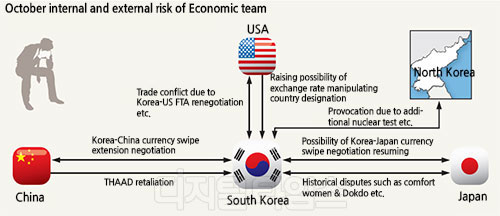North Korean Nuclear & currency swap in its ‘culmination’… ``October crisis’ to come?
Kwon Dae-gyung | kwon213@ | 2017-09-15 11:25:20

The Korean economic team, which ran barely after the inauguration of Moon Jae-in, appears to have faced a major crisis both inside and outside of Korea in October.
First of all, whether to extend the maturity of the currency swap agreements in the next month or to designate the currency manipulation station by the US Treasury is emerging as a big problem. Besides, if North Korea conducts further provocations around October 10, the geopolitical risk of the Korean peninsula is likely to peak. If the Korean government cannot respond to these risks properly, it is pointed out that despite the global economic recovery, the economy may fall into a dump again.
According to the Ministry of Strategy and Finance and the Bank of Korea on September 14, the currency swap of CNY 360 billion (about USD 56 billion) will expire on October 10. The government has announced its intention to extend, but negotiations are sluggish as diplomatic conflicts such as the Sad deployment are widespread.
It is a matter of concern that China may be able to impose `monkeys` in negotiations as part of the THAAD retaliation. As the normal currency swap confirms whether to extend one week before expiration, it is expected that the beginning of October, the Chuseok season, will be the first peak. If the currency swap is not extended, Korea will meet the situation of colostrum that stops swapping with major partner countries such as China, USA and Japan.
One day call swap is darker. The currency swap between the two countries started at USD 2 billion in 2001 and rose to USD 70 billion in 2012, but was suspended in February 2015. It is unclear whether the resumption of negotiations will be resumed due to the establishment of the comfort women`s prize and the Japanese government`s stubborn opposition to the past. The discontinuation of currency swap with major nations means that the foreign exchange shields that can be taken when the volatility of the international financial market grows.
Lee Chang-sun, a researcher at the LG Economic Research Institute, said, "The swap may be stopped as soon as the one-day swap ended with political reasons. Even if there is no swap, considering the foreign exchange reserves, it is enough to cope with it."
In October, the US Treasury Department`s currency manipulation bureau also includes Korea. The US Treasury Department`s report includes whether to specify the exchange rate manipulation bureau and in-depth analysis countries for major trading partners. Under the US Trade Promotion Act, the requirements for the in-depth analysis include: a trade surplus of USD 20 billion or more annually; a current account surplus of more than 3 percent in GDP; and intervening dollar purchases of more than eight months. Although the probability of appointing a currency manipulation station is low because Korea does not apply to the dollar buying intervention item, it is crucial whether it meets the requirement to specify the exchange manipulation station prescribed in the General Trade Law. If the US trade surplus and current account surplus are excessive, the exchange rate manipulation country can be designated as a currency exchange rate. In other words, the designation of the currency manipulation station is a political background. The problem is that the US Treasury Department is able to include Korea in the process of designating China as a currency manipulation country as a part of the check against G2 hegemony in consideration of the issue of equity. If designated as a currency manipulation country, you will face negotiations for balance of payments balance. It is exposed to the pressure of renegotiating a larger FTA and increasing the burden. Lee Yoon-suk, chairman of the Institute of International Finance at the Korea Institute of Finance, pointed out at a recent seminar that "Trump administration has ambiguous standards for designating exchange rate manipulation stations, and it is possible to pursue the designation considering the strong trade policy trend during that period."
Meanwhile, the domestic economic situation is not even worse. The unemployment rate for youths was the highest at 9.4% since 1999, and household debts exceeded KRW 1,400 trillion in the same month as the same. The price of Seoul apartment, which was frozen due to two measures, rose 0.01% on the 11th, and turned to rise after stopping the decline for 5 consecutive weeks. It is a dispute that the market is wriggling. In addition, the revision of laws necessary to implement proper policies such as revision of the top 100 national affairs and tax law is expected to be difficult at the regular session of the National Assembly.
By Kwon Dae-gyung & Lee Mi-jeong & Kim Min-soo kwon213@dt.co.kr
